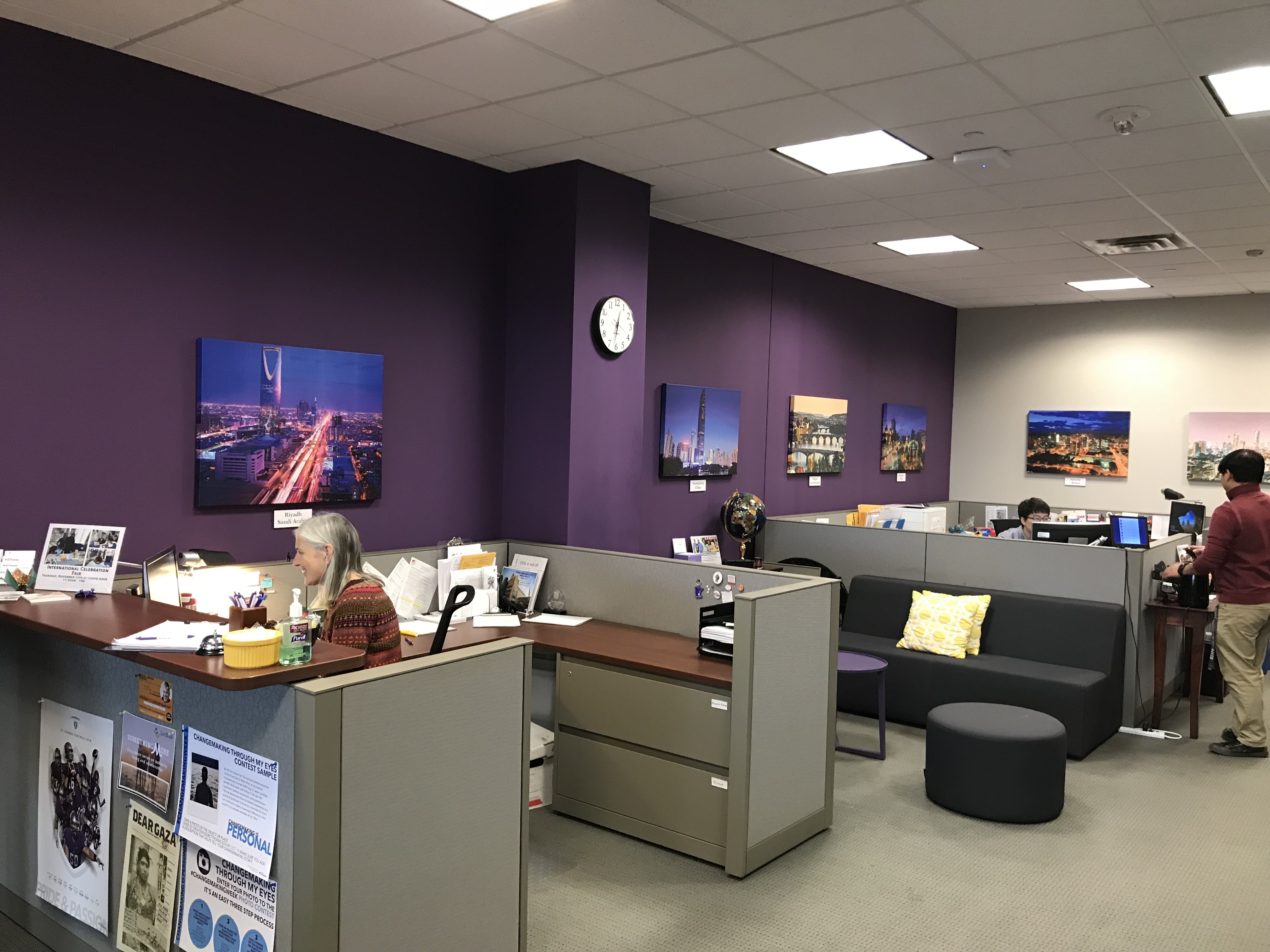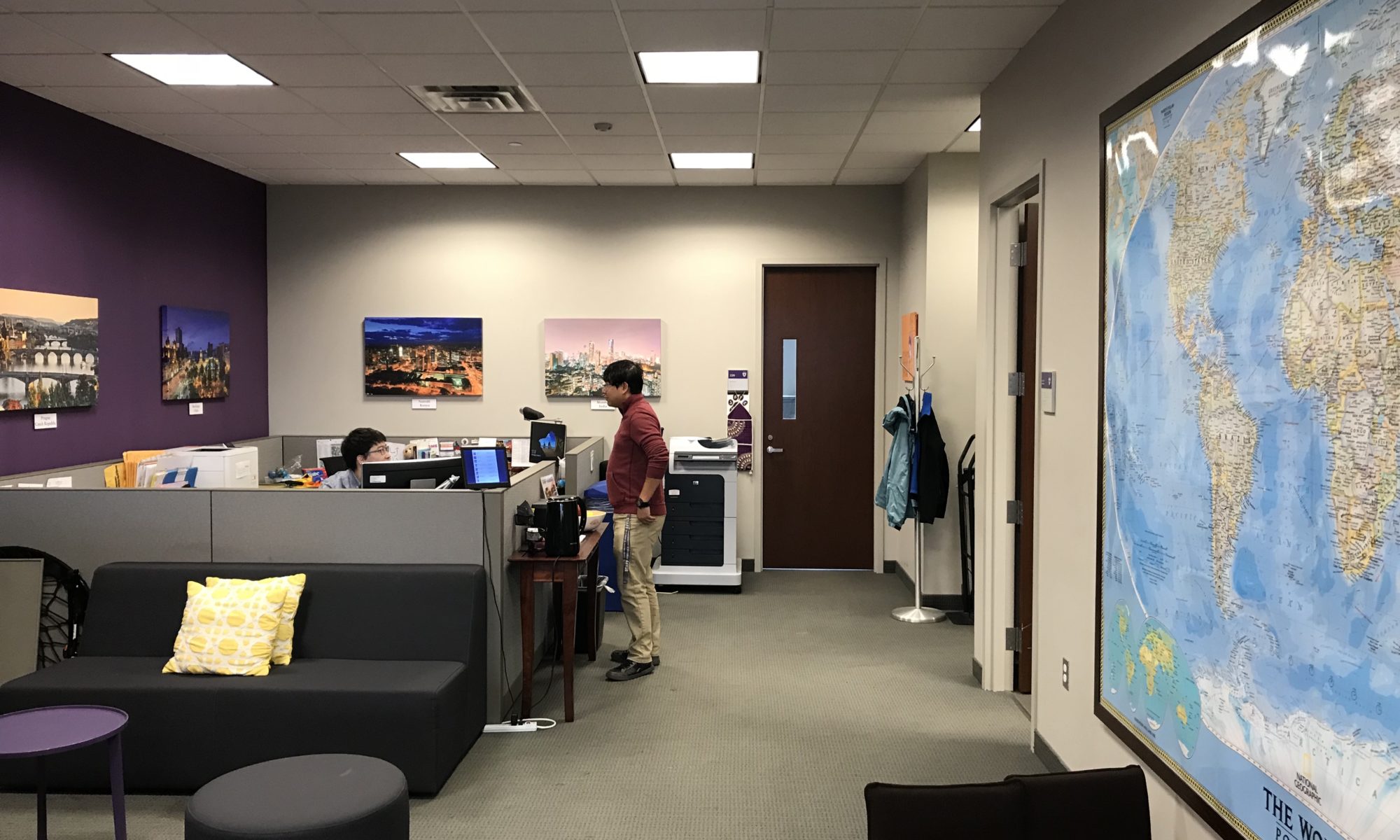 The Office of International Students and Scholars is located on the second floor of ASC in room 218. The office was designed to assist international students to life at St. Thomas. (TommieMedia/Carly Noble)
The Office of International Students and Scholars is located on the second floor of ASC in room 218. The office was designed to assist international students to life at St. Thomas. (TommieMedia/Carly Noble)
The Office of International Students and Scholars offers a variety of services assisting international students in their transition to life on and off campus.The office’s focus is to provide support and education for international students while integrating them into the university’s culture.
“International students have so much value and perspective, and everybody learns so much both ways,” said Lori Friedman, Director of the Office of International Students and Scholars.
Friedman oversees recruiting, admitting, communication, immigration documents, immigration status, orientation, and assists international faculty and staff on the immigration side preparing work petitions.
The OISS provides a week-long orientation program upon international students’ arrival in both the fall and spring semesters.
Students have the option to take a six-week extended orientation program where they meet on some Friday afternoons to continue adjustments, seek involvement opportunities and focus on academic expectations in the classroom.
“We really work on that because we have a number of cultural programs designed to get international students engaged on campus as well as connect them with other students, especially American domestic students,” Friedman said.
The OISS hosted its Global Tommies Excursion Sept. 28-29 in Webster, Wis. This overnight retreat is intended for international and domestic students to further their intercultural learning.
Along with the various programs the OISS provides, the staff also prepares immigration documents for international students so they maintain their legal status in the U.S. and can work if they want.
Applying for jobs is a process that can be a bit lengthy and very discouraging at first for international students, Friedman shared.
“It’s not necessarily our process that’s difficult,” Friedman said. “it’s more convincing the employer that it’s not difficult to hire an international student.”
The media contributes to the skepticism about hiring international students, Friedman said. Many employers are scared of the fees and lack of guarantee that anything will work out if they sponsor a work visa fee for an international employee.
International students can do internships without getting sponsored, but employers often see internships as a future job. Many won’t take the risk if they can’t hire them later.
The biggest complication during the application process is when it asks one of two questions or both: “Do you have authorization to work in the U.S.?” and “Do you now or will you ever require H1B visa sponsorship?”
Friedman specified that if students say they do not have authorization for work or might require a sponsorship, companies automatically take them off the radar and many students don’t get callbacks because of that.
“We collaborate with the Career Development Center who is also trying to work with employers, helping them understand that it’s hard, but not that hard,” Friedman said.
International students jump through many hoops to get an internship or job. It’s about finding a company that is open to it, because oftentimes companies that hire a lot of international people are more accustomed to it or find other ways through consulting agencies, Friedman informed.
The department’s goal for this school year is to partner with other departments so international students can meet more domestic students.
“There is a very big divide here on campus. It’s hard for international students to go out of their way to make an American friend. A lot of the American friends have their own friend group since high school,” Friedman said.
There is a total of 550-600 graduate and undergraduate international students at St. Thomas this year, most of whom come from China, India, Saudi Arabia, Vietnam, Nepal and Norway.
Sophomore Halvor Houg, an international student from Norway said his experience here has been extremely rewarding and challenging at times, but he is keeping his options open after graduating.
“I have yet to decide what to do after college. My initial plan was to go back to Norway, but if an opportunity to stay for work opens, I would consider it for sure,” Houg said. “I hope to end up in a situation where I can live in one country without giving up what I have in the other.”
Friedman values working with international students on a daily basis.
“I love connecting with the students getting to know them on a deeper level,” Friedman said. “From stepping off the plane here to graduation, it’s just amazing what they overcome.”
Carly Noble can be reached at nobl1781@stthomas.edu


Let’s face it, being an international student away from home for the first time is difficult, compounded by our complex culture and language problems. Welcoming and assimilation assistance must come from numerous sources, including the White House, to aid these young people embarking on life’s journey. Most struggle in their efforts and need guidance from schools’ international departments, immigration protection, host families, concerned neighbors and fellow students, and even informative books to extend a cultural helping hand.
Something that might help anyone coming to the US is the award-winning worldwide book/ebook “What Foreigners Need To Know About America From A To Z: How to Understand Crazy American Culture, People, Government, Business, Language and More.” Used in foreign Fulbright student programs and endorsed worldwide by ambassadors, educators, and editors, it identifies how “foreigners” have become successful in the US, including students.
It explains how to cope with a confusing new culture and friendship process, and daunting classroom differences. It explains how US businesses operate and how to get a job (which differs from most countries), a must for those who want to work with/for an American firm here or overseas.
It also identifies the most common English grammar and speech problems foreigners have and tips for easily overcoming them, the number one stumbling block they say they have to succeeding here.
G